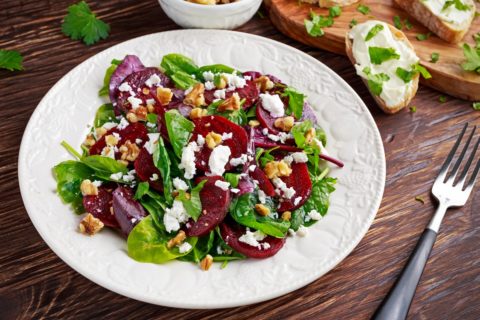By Stephen T. Sinatra, M.D., F.A.C.C., F.A.C.N., C.N.S., C.B.T.
There are quite a few vegetables that fall into the “love ’em or hate ’em” category, and beets are probably right at the top of this list. Some people enjoy their “earthy” taste, while others simply aren’t fans.
But for how polarizing of a vegetable it is, one thing’s for sure: the benefits of beets can’t be beat. They’re loaded with vitamins, minerals, antioxidants, and many other compounds that are a real boon for your health.
A Versatile Veggie
Beets (or beetroots) have been around for millennia. The earliest evidence of their cultivation was around 2000 BC in the Mediterranean region (hence, they’re part of the heart-friendly Mediterranean diet).
Today, beets are some of the most versatile vegetables. They can be prepared a multitude of ways (more on that later), and they’re unique in that you can eat the entire plant—the leaves, stems, root (which is the actual beet), and even the skin if you so desire. The leaves and stems are often discarded in favor of the root, but these nutrient-rich beet greens are beneficial in their own right. I like to sauté/steam beet greens and eat as a side veggie, but you can also add them to salads or include them in stews and other dishes.
More than a just a colorful food, beets were historically used in folk medicine to treat a variety of ailments, including anemia, headaches, constipation, fevers, irritability, and heart problems.
Beet Nutrition
 It makes sense that beets worked to alleviate so many of these health issues because beet nutrition is second to none.
It makes sense that beets worked to alleviate so many of these health issues because beet nutrition is second to none.
Beets are rich in vitamins A, C, and K, folate, potassium, copper, and manganese, and the greens are a great source of phytonutrients such as lutein and zeazanthin (which are critical for eye health). Beets also contain protective antioxidants like betalain, the pigment that gives this vegetable its gorgeous red color. Betalain is so potent that it can stain your hands and turn your urine (and anything else it touches) a reddish-pink color! Preliminary studies also suggest it has antioxidant and anti-inflammatory properties.
Even more exciting for this cardiologist, beets (especially if they’re juiced or blended and consumed in liquid form) are very high in nitrates. This is so important for heart health because the body converts nitrates to nitric oxide, a compound crucial in supporting overall cardiovascular function.
Just as important, beets are a low-calorie source of fiber—which fills you up and keeps you satiated for long stretches of time, and also keeps you regular.
The only real downside is that beets are relatively high in sugar (sucrose). In fact, along with corn and sugar cane, sugar beets (which are in the same beet family as the red and yellow beets we eat) are used to produce refined sugar.
But don’t hold that against them; the health benefits of beets far outweigh this one drawback. I wholeheartedly recommend adding beets (and beet greens) to your diet, especially if doing so helps satisfy cravings for sweets. Here are some of the top reasons why…
Beets Benefit Heart Health
As I alluded earlier, the heart health benefits of beets are truly amazing. It’s the main reason I eat and juice them regularly.
Nitric oxide is a powerful vasodilator. This means it relaxes and dilates the arteries, which in turn lowers blood pressure by allowing blood to flow through with less resistance. It also boosts circulation and curbs dangerous inflammation and oxidative stress.
Beets are also recognized as one of the best foods to lower levels of the dangerous amino acid homocysteine. High homocysteine contributes to clogged arteries and premature aging, particularly of the blood vessels.
Finally, thanks to their high fiber content, beets help maintain healthy cholesterol levels. The fiber essentially prevents the absorption of dietary cholesterol by soaking it up and forming a gelatinous substance that the body can’t absorb. Fiber also helps with speedier elimination of cholesterol and other toxins from the body.
Beets Boost Endurance and Stamina
After heart health, beets’ second most significant claim to fame is their ability to boost performance and stamina, particularly in endurance athletes such as runners, swimmers, and cyclists. This is because nitrates improve the efficiency of mitochondria, the energy generating “factories” in each cell.
In one study that tested the effects of whole beets on exercise performance, researchers found that consuming whole beets improved running performance by, on average, a 41-second faster finish time. These researchers suggested eating the beets one hour prior to exercise for a similar boost.
In another study, beetroot juice increased cycling power output and enhanced performance by 2.8% in a 4-km trial and 2.7% in a 16.1-km trial.
Other Health Benefits of Beets
As if that wasn’t enough, beets also contain compounds that can help prevent the accumulation of fat in the liver. This is especially important for people with poor blood sugar control, which raises the risk of fatty liver disease. Beets’ robust fiber content also comes into play here, since it also helps flush toxins from the liver. That beets are such great detoxifiers is why I always try to include raw beets in my blended fruit and veggie antioxidant smoothies!
Other benefits of beets include increased weight loss, improved eye and brain health, and better sex. You read that right! Beets have even been called “nature’s Viagra.” Erectile dysfunction drugs work by increasing nitric oxide and enhancing blood circulation throughout the body—including the penis. Since beets help the body do this naturally, having some beets (or better yet, drinking beet juice) a few hours before sex may be Nature’s secret remedy for E.D.
Ways to Eat the Beet
There are countless ways to prepare and eat beets—the sky’s the limit!
They can be eaten raw or cooked. If cooked, you can choose to boil, broil, bake, sauté, steam, grill, or roast. Once cooked, they are just as delicious hot or cold.
If you’re into fermenting, beets are a perfect vegetable to pickle. If you have a dehydrator, you can create your own beet chips. Spiralized beets can be used in place of pasta. Or, you can blend whole beets and beet greens into smoothies. And if you have a juicer, I consider beet juice a “superfood.”
Beets make excellent side dishes and salad toppers, and if you’ve never had beet soup (borscht), you don’t know what you’re missing!
Even if you don’t consider yourself a beet lover, I encourage you to reconsider and try beets prepared differently than you’ve had in the past. With so many options, you’re sure to find a way to incorporate them into your diet and reap the tremendous benefits!

Awesome Beet Recipe: Arugula Salad with Beets and Goat Cheese
This delightful salad makes a great appetizer, lunch or main meal.
You’ll need:
- 3 to 6 roasted beets, sliced
- 4 Tbsp goat cheese
- 1 to 2 packages of organic arugula or spinach
- ½ cup chopped walnuts
- Optional: 1 cup yellow cherry tomatoes, halved
- 1/3 cup extra virgin olive oil (or orange-flavored olive oil)
- 1 to 2 Tbsp balsamic vinegar
- Sea salt and pepper, to taste
To roast beets, simply preheat your oven to 375, then wash the beets, cut the greens off, and wrap them in parchment paper, and then aluminum foil. Bake them for about an hour, then let them cool. Once they are cool, slice off an end, then peel the skin off with your fingers. Slice into bite sized pieces, and set aside.
Make the dressing – in a small jar, combine the blood orange olive oil and balsamic vinegar, then add a a few grinds each of salt and pepper. Put on the lid and shake vigorously for a few seconds.
Place enough salad greens for four into a large bowl, or distribute evenly among individual plates. Add the cooled beets, then top with optional yellow cherry tomatoes, crumbled goat cheese, and chopped walnuts. Drizzle with desired amount of blood orange dressing. Serves 4.
P.s. Don’t let the beet greens go to waste! While the beets are roasting, wash and slice the greens, then steam in a pan until wilted and you can easily slice through the stems. Drain water and serve drizzled with olive oil and freshly ground salt and pepper – delicious!
References
- Murphy M et al., Whole beetroot consumption acutely improves running performance. J Acad Nutr Diet. April 2012;112(4):548-552. Last accessed August 16, 2018.
- Lansley KE, et al., Acute dietary nitrate supplementation improves cycling time trial performance. Med Sci Sports Exerc. 2011 Jun;43(6):1125-31. Last accessed August 16, 2018.
- The George Mateljan Foundation. Beets. WHFoods.org, last accessed Aug. 17, 2018.
© Stephen Sinatra, MD. All rights reserved.










